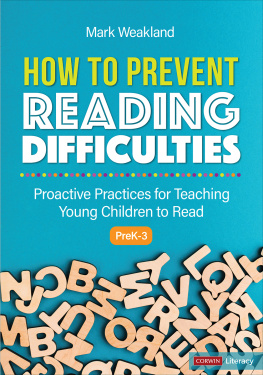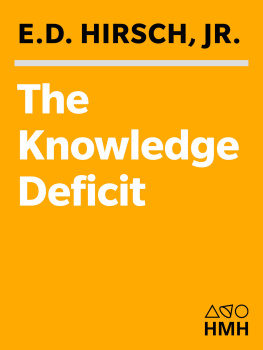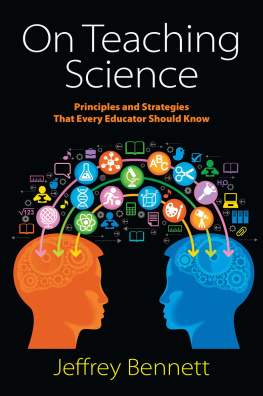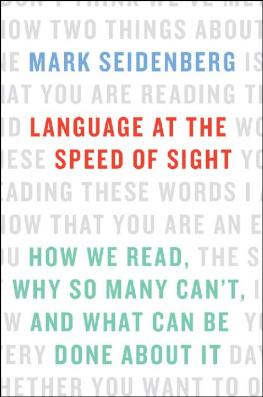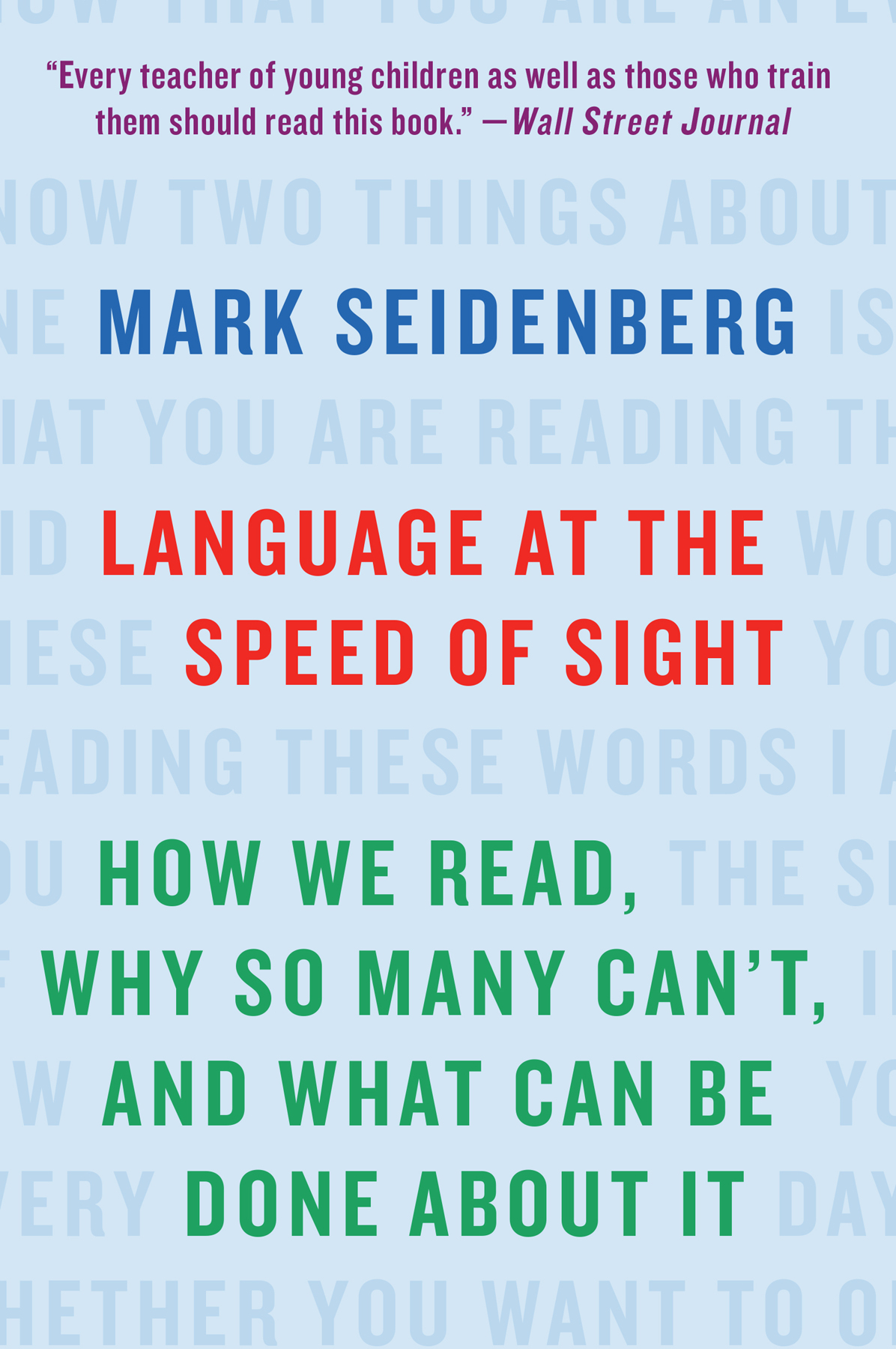Copyright 2017 by Mark Seidenberg
Hachette Book Group supports the right to free expression and the value of copyright. The purpose of copyright is to encourage writers and artists to produce the creative works that enrich our culture.
The scanning, uploading, and distribution of this book without permission is a theft of the authors intellectual property. If you would like permission to use material from the book (other than for review purposes), please contact permissions@hbgusa.com. Thank you for your support of the authors rights.
Basic Books
Hachette Book Group
290 Avenue of the Americas, New York, NY 10104
http://www.basicbooks.com/
@BasicBooks
First Trade Paperback Edition: March 2018
Published by Basic Books, an imprint of Perseus Books, LLC, a subsidiary of Hachette Book Group, Inc. The Basic Books name and logo is a trademark of the Hachette Book Group.
The Hachette Speakers Bureau provides a wide range of authors for speaking events. To find out more, go to www.hachettespeakersbureau.com or call (866) 376-6591.
The publisher is not responsible for websites (or their content) that are not owned by the publisher.
The Library of Congress has catalogued the original edition as follows:
Names: Seidenberg, Mark S., author.
Title: Language at the speed of sight : how we read, why so many cant, and what can be done about it / Mark Seidenberg.
Description: New York : Basic Books, an imprint of Perseus Books, a division of PBG Publishing, LLC, a subsidiary of Hachette Book Group, Inc., [2017]
| Includes bibliographical references and index.
Identifiers: LCCN 2016046731| ISBN 9780465019328 (hardcover) |ISBN 9780465080656 (ebook)
Subjects: LCSH: Reading (Higher education) | Language experience approach in education. | Cognition disorders. | Psycholinguistics.
Classification: LCC LB2395.3 .S44 2016 | DDC 428.4071/1dc23
LC record available at https://lccn.loc.gov/2016046731
ISBN: 978-0-465-01932-8 (hardcover); ISBN: 978-0-465-08065-6 (e-book);
ISBN: 978-1-5416-1715-5 (paperback)
E3-20180209-JV-NF
In Language at the Speed of Sight, [Seidenberg] develops a careful argument, backed by decades of research, to show that the only responsible way to teach children to read well is to build up their abilities to connect reading with speech and then to amplify these connections through practice, developing skillful behavioral patterns hand in hand with the neurological networks that undergird them. Every teacher of young children as well as those who train them should read this book.
Wall Street Journal
An important and alarming new book. Seidenberg makes a strong case for how brain science can help the teaching profession
New York Times
Seidenberg unravels the science of reading with great flair. He is the ideal guideand it turns out that we need a guide to reading, even though weve been doing it most of our lives.
Washington Post
Seidenberg reviews the latest science on reading and makes an impassioned plea for putting this knowledge to use.
Scientific American
Cognitive neuroscientist Seidenberg digs deep into the science of reading to reveal the ways human beings learn how to read and process language. Seidenbergs analysis is backed up by numerous studies and table[s] of data. His approach is pragmatic, myth-destroying, and rooted in scienceand his writing makes for powerful reading.
Publishers Weekly
The neuroscience underlying [Seidenbergs] findings is complex, of course, but [he] does not often fall into thickets of technicality his discussions are clear and accessible. A worthy primer on the science of comprehending language.
Kirkus Reviews
No technologically advanced society exists without reading. This is the remarkable story of why and how it all works. From David Lettermans irony to posited Sumerian patent trolls, the writing is lively, informative, and supremely entertaining.
Daniel J. Levitin, bestselling author of This Is Your Brain on Music and The Organized Mind
Have you picked up the idea that reading is something that kids just pick up and shouldnt be rushed into, or that learning to read is something different from comprehension, or that a whole book about reading would be dull? Language at the Speed of Sight will disabuse you of all three notions and morepick it up and marvel at how hard it will be to put it down.
John McWhorter, author of Word on the Move and Talking Back, Talking Black
Few works of science ever achieve Italo Calvinos six qualities of our best writing: Lightness, exactitude, visibility, quickness, multiplicity, and consistency. Mark Seidenbergs new book achieves just that. If every educator, parent, and policy maker would read and heed the content of this book, the rates of functional illiteracy, with all their destructive sequelae, would be significantly reduced.
Maryanne Wolf, author of Proust and the Squid
A world-renowned expert explains the science of reading with clarity and witanyone who loves to read will be fascinated, and teachers will absolutely devour this book.
Daniel Willingham, author of Why Dont Students Like School?
Language at the Speed of Sight is an incisive tour through the fascinating science of reading. From cuneiform to dyslexia to the future of literacy, Seidenberg is a master guide wholucky for usis as gifted a writer as he is a scientist.
Benjamin Bergen, author of What the F
For Maryellen
With deepest [love, admiration, and gratitude].
For Claudia and Ethan
Fun. Food. Family.
And for showing me what I didnt know about reading, and the rest.
Look closely at the letters. Can you see, entering (stage right), then floating full, then heading offso soonhow like a little kohl-rimmed moon o plots her course from b to d
as y, unanswered, knocks at the stage door? Looked at too long, words fail, phase out. Ask, now that body shines no longer, by what light you learn these lines and what the b and d stood for. b o d y
JAMES MERRILL
I DONT THINK WEVE MET , but I know two things about you. One is that you are reading these words. And because youre reading these words, I also know that you are an expert at what this book is about. Which is reading.
A friend once gave me a scholarly 380-page book about the history of the pencil. I like pencils. Im good at using them. I like a fresh pink eraser tip. I just do not need to read about how they got that way. Perhaps reading is for you like the history of pencils is for me. Why read about reading?
Reading is one of the few activities you do every day whether you want to or not. Street signs, menus, e-mails, Facebook posts, novels, ingredients in Chex Mix. You read for work, for school, for pleasure; because you have to, because you want to, because you cant help it. That is a lot of practice over a long period. If it takes thousands of hours to become an expert at something like chess, we readers are in grandmaster territory.
One result is that everyone has an opinion about how they read. When you are introduced at the dinner table as someone who studies reading for a living, you hear all the stories. People tell me whether they read word by word or in big chunks. Whether they read visually or hear the sounds of words in their heads while they read. How they learned to read and how their kids learned. Many confessions from people who say they are slow readers, more often than not from accomplished people in fields that seemingly demand a high level of reading competencelawyers or school superintendents, say. Most of you think that other people read faster than you. Its the opposite of Lake Wobegon: reading is the land where the folk are all below average.


